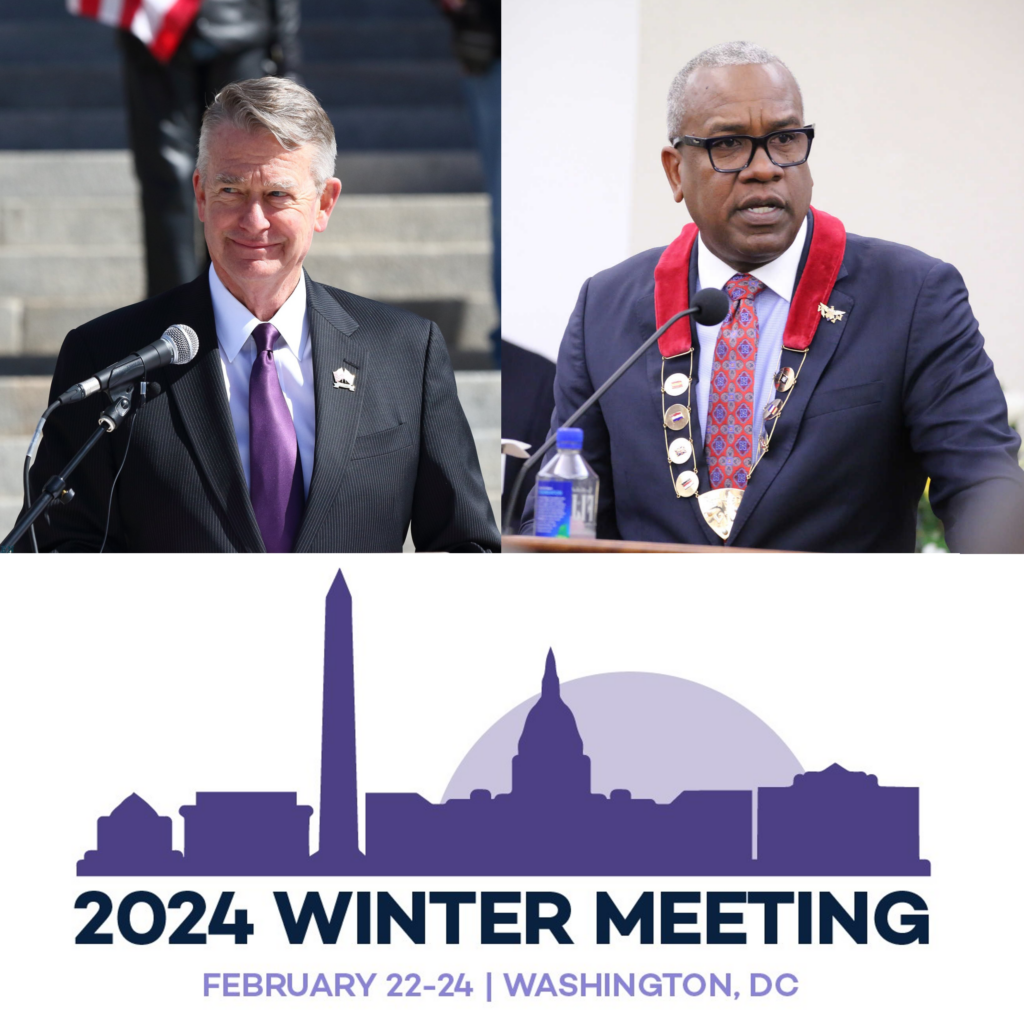
The Education, Workforce and Community Investment Task Force has jurisdiction over a broad range of issue areas, including: labor and workforce development, career and technical skills, PreK-12 education, postsecondary education, criminal justice, housing and agriculture. During the 2024 NGA Winter Meeting, February 22-24 in Washington, DC, Task Force co-chairs Idaho Governor Brad Little and U.S. Virgin Islands Governor Albert Bryan Jr., will lead a discussion on the comprehensive Farm Bill priorities NGA released in September 2023, as well as Congress’s recent provision of a one-year extension on the Farm Bill. Governors will be joined by Jennifer Lester Moffitt, Under Secretary for Marketing and Regulatory Programs at the U.S. Department of Agriculture, and National Association of State Departments of Agriculture CEO Ted McKinney to engage in substantive discussions regarding Farm Bill programs and initiatives actively underway in their states and territories. The session will emphasize the critical role of these programs in sustaining and enhancing agricultural prosperity, recognizing that these programs are indispensable instruments in bolstering agricultural resilience and fostering rural development.
Governors Little and Bryan recently shared insights into the work the Education, Workforce and Community Investment Task Force is leading, including details about the meeting the Task Force will hold during the NGA Winter Meeting.
What work is taking place at the state or territory level to support farmers and the agriculture industry?
Governor Little: Idaho has made historic investments in water infrastructure, transportation, and workforce training to help Idaho’s robust agriculture industry stay strong. Idaho is taking control of its water so we’re prepared for the potential of prolonged drought, and our unprecedented investments in transportation – without raising taxes or fees – are helping farmers get their product to market safely. In addition, our new LAUNCH grants encourage graduating high school seniors to enter education and training programs that lead to in-demand careers, including professions at all levels in the ag industry. Idaho also has championed historic tax relief over the past few years, so businesses and workers can keep more of their earnings in their pockets. As the least regulated state in the country, Idaho is proud to promote a business-friendly environment that supports agriculture.
Governor Bryan: One of the primary and pivotal initiatives that is currently in progress to support farmers and the industry is the gradual implementation of the Virgin Islands Agricultural Plan, which is the state plan for agricultural development in the territory. The plan was finalized and approved by the Legislature and the Governor in 2022. This major, historic accomplishment set in motion a series of on-going activities and tasks in support of farmers and the agricultural industry. To date, funding appropriated by the legislature has supported many initiatives of the plan. These outcomes include the expansion of a local lending and grant program for farmers, the launching of an agriculture business center at three locations, the provision of funds to hire some critical staff at the VI Department of Agriculture, and the formation of the Local Farm and Food Council to guide the implementation of the Virgin Islands Agricultural Plan. In addition to these initiatives by the state government, the University of the Virgin Islands through its Land Grant Program has revived its previously dormant academic program in support of the farming sector. A team of faculty members has been hired and a broad range of courses is being offered. For the first time in more than three decades academic programs in the field of agriculture are being offered on the certificate, associate, and bachelor’s degree levels.
What work do you think needs to take place at the federal level related to the Farm Bill and other policy matters that impact farmers and consumers?
Governor Little: People often forget that USDA manages wildfires and has a large component in the Farm Bill focused on fires. This year, the forestry title of the Farm Bill is critical to staving off a pending wildfire crisis – not just in the West, but across ALL 50 states. In a state like Idaho, where more than 63% of the land is federally owned, agencies like the Forest Service and BLM need additional categorical exclusions to execute forest management practices that will PREVENT wildfires. The focus here MUST be on utility rights of ways, which not only pose a wildfire risk but the loss of power during a catastrophic burn that can leave rural communities without lifesaving resources. Congress must make this a priority in 2024. This will also help farmers and ranchers who year in and year out lose access to grazing allotments and farm ground due to wildfires. At the end of the day, consumers will win with less wildfire threats and more land that can be utilized to produce a stronger domestic food supply.
Governor Bryan: From the perspective of the Virgin Islands, two items are of concern relative to the Farm Bill. Firstly, the USDA’s Farm Service Agency administers the Reimbursement Transportation Cost Payment (RTCP) Program which benefits geographically disadvantaged producers, including farmers in the USVI. This is a great program; however, the issue is that the funds allotted for this program should keep pace with the increasing number of farmers that apply for program benefits. In some years, farmers are reimbursed for a relatively lower (compared to other years) percentage of their total submitted costs due to the total Farm Bill allotment in comparison to the total number applicants and total requests for reimbursement. Secondly, the USDA Farm Service Agency also administers the Non-Insured Crop Disaster Assistance Program (NAP), which compensates farmers for non-insured crop losses due to adverse and natural occurrences such as droughts, heat, floods, earthquake, storms, etc. On the U.S. mainland producers are systematically and automatically eligible for all benefits resulting from all allowable causes. However, in the USVI farmers are routinely only eligible for benefits when losses are due to Named Storms and Hurricanes. For Virgin Islands farmers to receive benefits as a result of crop losses resulting from drought, heat, pests, etc., a request for a waiver must be submitted. Please note that in 2023 the VIDA requested and received a waiver from USDA which allowed USVI farmers to benefit from losses due to the prolonged, severe drought in the territory. I suggest that provisions of the Farm Bill support the eligibility of farmers in the USVI when losses are due to all eligible causes of loss without the need for waiver requests which are subject to an approval/disapproval process. This is especially important since local farmers have no access to crop insurance programs in the territory.
Can you please share how you think the NGA Winter Meeting helps further bipartisan policy solutions?
Governor Little: Governors understand better than anyone that in order to get things done, you have to work well with others. Governors are most successful when they approach policy goals with pragmatism and a true desire to move the needle. The NGA winter meeting provides a forum for Governors from across the political spectrum to come together, share ideas and learn from one another.
Governor Bryan: Bipartisan relationships in Washington, DC, the states and territories, and across the globe are key to progress, meaningful legislation, and transformation. The NGA Winter Meeting is at the heart of relationship building, change, learning and development. In addition to the winter meeting, other meetings and NGA support during the year provides a solid foundation to achieve state and territorial mission critical goals. The U.S. Virgin Islands are better for it!












